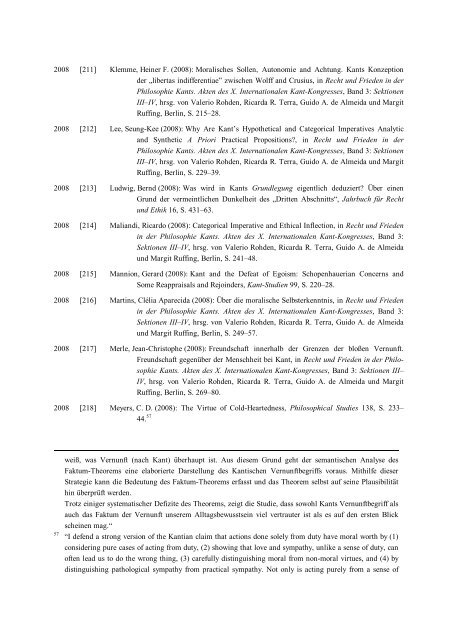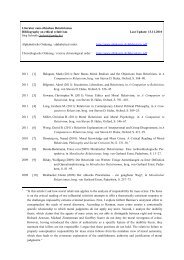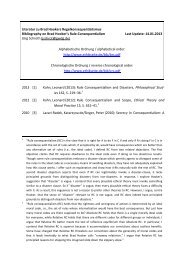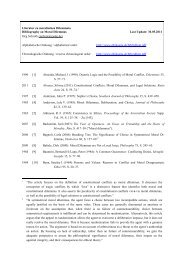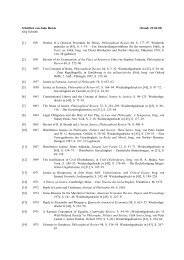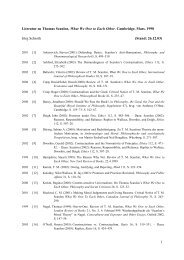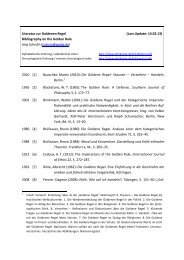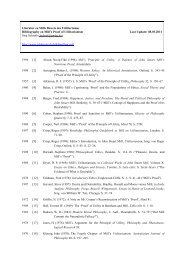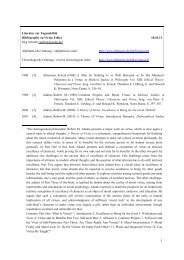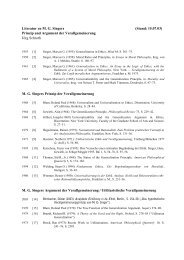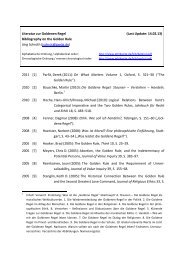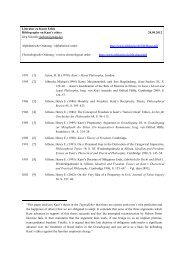Chronologische - Ethikseite
Chronologische - Ethikseite
Chronologische - Ethikseite
Create successful ePaper yourself
Turn your PDF publications into a flip-book with our unique Google optimized e-Paper software.
2008 [211] Klemme, Heiner F. (2008): Moralisches Sollen, Autonomie and Achtung. Kants Konzeption<br />
der „libertas indifferentiae” zwischen Wolff and Crusius, in Recht und Frieden in der<br />
Philosophie Kants. Akten des X. Internationalen Kant-Kongresses, Band 3: Sektionen<br />
III–IV, hrsg. von Valerio Rohden, Ricarda R. Terra, Guido A. de Almeida und Margit<br />
Ruffing, Berlin, S. 215–28.<br />
2008 [212] Lee, Seung-Kee (2008): Why Are Kant’s Hypothetical and Categorical Imperatives Analytic<br />
and Synthetic A Priori Practical Propositions?, in Recht und Frieden in der<br />
Philosophie Kants. Akten des X. Internationalen Kant-Kongresses, Band 3: Sektionen<br />
III–IV, hrsg. von Valerio Rohden, Ricarda R. Terra, Guido A. de Almeida und Margit<br />
Ruffing, Berlin, S. 229–39.<br />
2008 [213] Ludwig, Bernd (2008): Was wird in Kants Grundlegung eigentlich deduziert? Über einen<br />
Grund der vermeintlichen Dunkelheit des „Dritten Abschnitts“, Jahrbuch für Recht<br />
und Ethik 16, S. 431–63.<br />
2008 [214] Maliandi, Ricardo (2008): Categorical Imperative and Ethical Inflection, in Recht und Frieden<br />
in der Philosophie Kants. Akten des X. Internationalen Kant-Kongresses, Band 3:<br />
Sektionen III–IV, hrsg. von Valerio Rohden, Ricarda R. Terra, Guido A. de Almeida<br />
und Margit Ruffing, Berlin, S. 241–48.<br />
2008 [215] Mannion, Gerard (2008): Kant and the Defeat of Egoism: Schopenhauerian Concerns and<br />
Some Reappraisals and Rejoinders, Kant-Studien 99, S. 220–28.<br />
2008 [216] Martins, Clélia Aparecida (2008): Über die moralische Selbsterkenntnis, in Recht und Frieden<br />
in der Philosophie Kants. Akten des X. Internationalen Kant-Kongresses, Band 3:<br />
Sektionen III–IV, hrsg. von Valerio Rohden, Ricarda R. Terra, Guido A. de Almeida<br />
und Margit Ruffing, Berlin, S. 249–57.<br />
2008 [217] Merle, Jean-Christophe (2008): Freundschaft innerhalb der Grenzen der bloßen Vernunft.<br />
Freundschaft gegenüber der Menschheit bei Kant, in Recht und Frieden in der Philosophie<br />
Kants. Akten des X. Internationalen Kant-Kongresses, Band 3: Sektionen III–<br />
IV, hrsg. von Valerio Rohden, Ricarda R. Terra, Guido A. de Almeida und Margit<br />
Ruffing, Berlin, S. 269–80.<br />
2008 [218] Meyers, C. D. (2008): The Virtue of Cold-Heartedness, Philosophical Studies 138, S. 233–<br />
44. 57<br />
weiß, was Vernunft (nach Kant) überhaupt ist. Aus diesem Grund geht der semantischen Analyse des<br />
Faktum-Theorems eine elaborierte Darstellung des Kantischen Vernunftbegriffs voraus. Mithilfe dieser<br />
Strategie kann die Bedeutung des Faktum-Theorems erfasst und das Theorem selbst auf seine Plausibilität<br />
hin überprüft werden.<br />
Trotz einiger systematischer Defizite des Theorems, zeigt die Studie, dass sowohl Kants Vernunftbegriff als<br />
auch das Faktum der Vernunft unserem Alltagsbewusstsein viel vertrauter ist als es auf den ersten Blick<br />
scheinen mag.“<br />
57 “I defend a strong version of the Kantian claim that actions done solely from duty have moral worth by (1)<br />
considering pure cases of acting from duty, (2) showing that love and sympathy, unlike a sense of duty, can<br />
often lead us to do the wrong thing, (3) carefully distinguishing moral from non-moral virtues, and (4) by<br />
distinguishing pathological sympathy from practical sympathy. Not only is acting purely from a sense of


